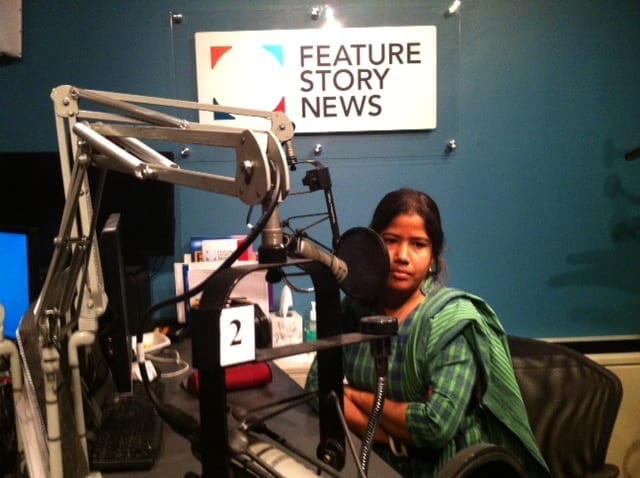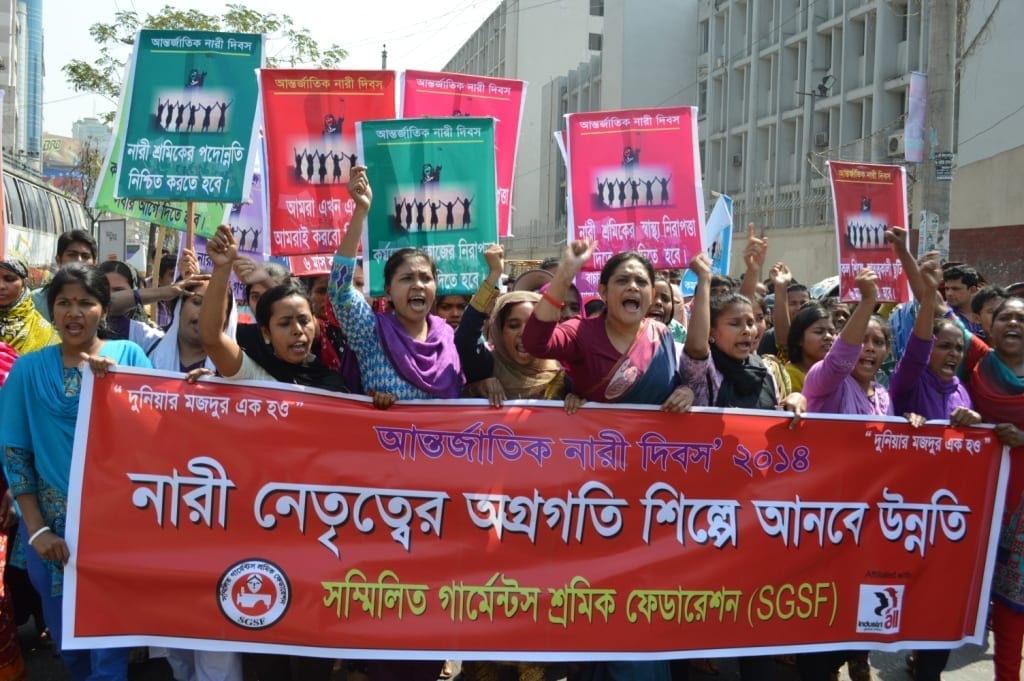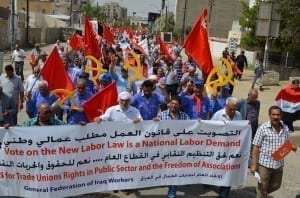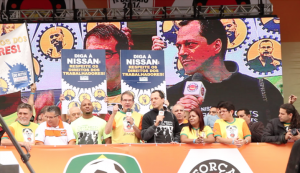
Jun 26, 2014
CHITTAGONG, BANGLADESH—In this coastal city of 6.5 million people, the second center of garment production in Bangladesh after the capital, Dhaka, a re-energized labor movement is making real progress in organizing workers. At a Solidarity Center training program for two trade union federations, 12 young organizers—most on the job for less than six months—were advancing beyond the basics of organizing and moving up the knowledge ladder fast.
It helped that two other attendees—Nomita, president of the Bangladesh Independent Garment Workers Union Federation (BIGUF), and her colleague, Chandon, BIGUF vice president, joined the training to support and inspire. Between them, they have two decades of experience organizing in a hostile environment, and have been instrumental in guiding the new activists into a ramped up, more strategic form of organizing.
This was not their first training program, and the organizers were delving into more sophisticated material, including chapter and verse on labor law, organizing women workers, developing leaders and representative unions, incorporating new tactics into campaigns and how to interview workers to document the unfair labor practices (including sexual harassment, firings, threats and violence) that they and their colleagues are facing on a daily basis.
Since the Tazreen Fashions factory fire of November 2013 through the end of May 2014, several independent unions including BIGUF and the Bangladesh Garment Workers Independent Federation (BGIWF), also represented at this training, have organized 251 unions, with 166 achieving registration, a government requirement. In all, the factory unions represent 75,000 workers. In Chittagong alone during this period, workers organized 45 unions with 34 gaining registration—a 79 percent success rate.
But organizing and registration is just the beginning for these brave workers. The next step is employer recognition. After that, unions will present a charter of demands (which might include items taken for granted in the West, such as payment of the minimum and overtime wages, and improved factory safety) to management to form the basis for collective bargaining. Then, hopefully, negotiations. Each step is difficult, but these new organizers are well aware how critical these benchmarks are to the lives and livelihoods of Bangladesh garment workers.

Jun 13, 2014
More than 60 workers at a Bangladesh washing facility have been fired since late April and at least one union leader has been physically assaulted in what their union says is a campaign to end union representation at the plant.
The Sommilito Garments Sramik Federation (SGSF), which represents the workers at the Raaj RMG Washing Plant, says the incidents escalated after the union made a formal request to management in March to begin collective bargaining. The factory union was officially registered in January.
One worker, the union treasurer, was fired while she was pregnant—effectively ending her union activity and her maternity benefits, says SGSF. Replacement workers are reportedly being hired only on the condition that they not join the union, and false criminal charges have been filed against several one union and two members including the union’s general secretary, according to SGSF.
The Solidarity Center’s Dhaka office sent a letter to the Ministry of Labor and Employment on April 23 asking ministry officials to resolve the terminations, illegal under Bangladesh law, and SGSF and the plant union have filed formal labor complaints. To date, government agencies have not responded.
The plant, located in Gazipur, outside Dhaka, the capital, provides services to many garment factories in the area. Dozens of workers trying to form unions at garment factories also have recently been threatened with mass termination, beaten and kidnapped. Many of their lawful applications for new factory-level unions have been rejected for dubious reasons.
Following the Rana Plaza collapse in April 2013, and other high-profile catastrophes, the government showed signs of recognizing worker rights and its own labor laws, allowing workers to form their own unions. As a result, garment workers have registered more than 130 factory-level unions in the past year.
But the recent violence and retaliation against workers seeking to exercise freedom of association has gone unpunished, and SGSF and other garment unions say the government must do more to protect workers who form unions at their factories.
SGSF is calling for Raaj to immediately reinstate terminated workers with back pay and to bargain collectively with workers and the union. Further, SGSF is seeking for dismissal of the false charges against union activists.
May 28, 2014
More than a dozen garment factory union leaders in Gazipur, Bangladesh, have been physically attacked or threatened with violence and even death in the past two weeks, according to the Bangladesh Independent Garment Workers Union Federation (BIGUF).
The attacks are centered on garment workers seeking to form unions at factories owned by East West Industrial Park, which operates 11 factories in a large manufacturing complex outside Dhaka, the capital. More than 15 garment union leaders, fearing for their safety, have left their homes and cannot return to work.
BIGUF leaders say they have met with East West managers, who indicated they would provide for a police presence outside the factory gates where many of the attacks have occurred, but so far, have not.
Garment workers at five East West factories began forming unions in March and sought to register their unions with the government.
The government has rejected all the applications, based on flimsy reasons such as the absence of a workers’ mother’s name, BIGUF leaders say. Last year, following the April 2013 collapse of Rana Plaza, which killed more than 1,110 garment workers, the Bangladesh government began registering new unions, with more than 130 gaining legal recognition in the last year. But union leaders fear the recent rejections signal a change in course.
After the garment workers filed for registration for their unions, which are affiliated with BIGUF, East West management attempted to form company unions. Each factory-level union sent a letter expressing concerns about management’s actions to the Bangladesh labor director, and BIGUF tried to file an official complaint with police, who refused to accept the report.
Despite garment workers’ success in establishing their own unions in the past year, workers and union organizers also have been harassed, threatened and some physically attacked when trying to exercise their rights to be paid what they are owed and to work in safer workplaces. But the scale of attacks on workers at East West is alarming, union leaders say. BIGUF has documented the attacks, some of which include:
• May 11: An executive committee member of European Pantaloon Fashion Limited Workers’ Union was abducted outside the factory by approximately a dozen men, who warned him against continuing his trade union activities.
• May 12: Two executive committee members of Pantaloon Fashion Limited Workers’ Union were abducted outside the factory at gunpoint, beaten and robbed. Workers identified the men as associated with the factory.
• May 20: Two supervisors from East West Fashion Garments Limited appeared at the union general secretary’s home and abducted him, taking him to an East West contractor’s office, where he was told that he would be killed if he continued his union activism.
• May 24: A union executive committee member of European Pantaloon Fashion Limited Workers’ Union was beaten outside his home by a group of unidentified men.
BIGUF is demanding an immediate end to violence and intimidation of workers and organizers at factories in the East West complex. BIGUF also is calling on management to hold the perpetrators of violence accountable; ensure the safety of union leaders, members and organizers, as well as their family members; guarantee the safety of union leaders so they can return to work; and recognize and negotiate with the unions at its factories.

May 7, 2014
Nomita Nath gets many calls each day at the union office in Chittagong, Bangladesh, from garment workers seeking immediate assistance.
Some are locked out of factory gates by supervisors who see them as union supporters and effectively fire them. Others are faced with an employer request to sign a blank piece of paper, which is “a very dangerous thing,” says Nomita. The tactic is frequently used by factory managers to retaliate against union supporters and enables employers to write false assertions above their signatures, making it look like a worker stole money or goods or rejects the union.
No matter what the request, says Nomita, “if a fellow worker has a problem, it is my problem.”
Nomita, president of the Bangladesh Independent Garment Workers Union Federation (BIGUF), began working in garment factories at age 12, and several years later, joined with co-workers to form a union at Eastern Fashion Ltd. with BIGUF’s assistance. She was elected president of the factory union and went on to participate in BIGUF trainings and in a fire safety program organized by the Solidarity Center. She now regularly trains worker leaders and organizers on organizing methods, labor law, gender inclusion and equity and fire safety. She traveled to Washington, D.C., in recent days, where she talked with Solidarity Center staff.
The pleas for help Nomita hears from garment workers highlight the discrepancy between an environment in which unions for the first time can be registered and the resistance workers face from employers when they try to do so.
Following the Rana Plaza tragedy last year in which more than 1,100 workers were killed when the multistory building collapsed, at least 130 unions have filed for official recognition, including 42 through BIGUF’s assistance. Yet when workers try to exercise their rights for safer workplaces, they are often harassed and threatened, with some supervisors going so far as to tell landlords not to rent to workers who support a union, says Nomita. Of the 42 unions joining with BIGUF, only five so far have collective bargaining agreements because employers put up roadblocks to concluding formal pacts.
In at least two factories this year, workers seeking to form a union have been physically attacked and beaten, with union organizers the target of violence as well. Nomita understands the dangers she faces as a worker advocate in Bangladesh.
“We know and we are aware we will be threatened,” she says. “But no matter what obstacles come our way, we’ll meet them.”
Most of the 4 million garment workers in Bangladesh are women, and that poses a special challenge for organizers seeking to help workers form unions, says Nomita. Women’s “entire family, their house, is dependent on women’s jobs. They’re afraid of losing it,” she says.
Nomita is passionate about helping women overcome barriers to forming unions, which she sees as the best way for women to assert their rights as citizens equal to men.
“I am a woman and I want female workers to have rights,” she says. “I’ve watched this since I was little. They try to suppress female workers. The only way to hear a woman’s voice is through the union.”
Helping women overcome the barriers to joining a union and achieving the collective strength they need to secure safe workplaces, living wages and respect on the job is the challenge that guides Nomita each day.
“That’s my struggle,” says Nomita. “Union and unity.”
May 2, 2014

Iraqi union members rally for changes to the country’s Saddam Hussein-era labor code. Credit: Wesam Chaseb Ouda
Union members in Bangladesh, Brazil, Iraq and Morocco were among Solidarity Center allies around the world who rallied, marched in parades and protested in the streets yesterday, marking May Day and the ongoing struggle to ensure workers have a place at the table in the larger global economy and at their workplaces.
In Brazil, UAW President Bob King joined the union Força Sindical at a May Day event with some 1.3 million workers. Iraq workers and their unions marched for passage of a revised law, now under debate in Parliament. Iraqi workers are still covered by a Saddam Hussein-era labor code.
Workers in Morocco celebrated the announcement of a 10 percent boost (over two years) in the minimum wage in the public and private sectors, an action spearheaded by trade unions. The minimum retirement pension also will be boosted, and student grants will increase. Workers say many improvements still must be made, however, and in rallies across the country challenged rising prices and high unemployment and called for social security coverage for all workers and respect for collective and personal freedom.

UAW Bob King (center, yellow shirt) joined Força Sindial and 1.3 million workers in Brazil. Credit: Solidarity Center
In Bangladesh, tens of thousands of garment workers turned out in events across the country. At the Jatiya Press Club in Dhaka, the capital, some 12,000 workers gathered, with many forming a human chain. Speaking at one event, Kamrul Hasan, president of Akota Garments Labor Federation, demanded workplace safety so garment workers never again die or become injured from factory fires or collapsed buildings, like Rana Plaza, which pancaked in last April, killing more than 1,110 workers.
In Gazipur, Bangladesh, women made up the majority of the 2,000 garment workers taking part in events sponsored by the Bangladesh Independent Garments Union Federation (BIGUF). Shumi, president of Masco Industries Ltd. (Knit and Composite) Workers Union, said thousands of workers turned out spontaneously this May Day to assert their rights to a union. Other Solidarity Center allies holding events include the National Garments Workers Federation’s (NGWF), the Bangladesh Garments and Industrial Workers Federation’s (BGIWF), the National Garments Workers Federation’s (NGWF) and the Bangladesh Federation of Workers Solidarity (BFWS).




